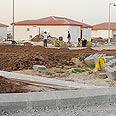
Caravillas for Gaza expelees
צילום: וועד ישובי גוש קטיף
Cold shoulder for periphery
Sderot residents, Gush Katif evictees, South Lebanon Army refugees are worrying sign of Israel's crumbling social contract
The town of Sderot is not large. Few people of influence come from there, there are no big hi-tech names, and no respected professors. It's a tough town, it's tough to make a living , out on the periphery of Israel and at the periphery of the minds of most Israelis.
We can assume that in the absence of the current security distress, most of us wouldn't even know Sderot exists. Like many settlements in the Negev, we don't really care too much about them.
Sderot is a flashing light, warning us that the basic solidarity that is supposed to hold us together is crumbling.
Warning lights
There are other warning lights, in addition to Sderot – the abuse of Gush Katif expellees who have been pushed to the sidelines of Israeli society after being forced from their homes and communities for the good of Israel's "peace and security."
And what about our former allies, the former soldiers of the South Lebanon Army, who spilled much blood alongside IDF soldiers? The treatment they have received since the IDFs hasty retreat from Lebanon six years ago is nothing short of a cold shoulder. And we recently learned that a committee of inquiry apparently whitewashed over the use of live ammunition against Israel's Arab citizens. They may have crossed a red line with their violent demonstration, but there is a long way from there to the use of live ammunition. That line must not be crossed.
Sderot presents us with the image of the rejected development towns in the south, and of the many unemployed who fill the streets of those towns.
This solidarity is also important for the folks who have joined the ranks of Israel's millionaire club this year, more than any other country. Their personal security anywhere in Israel is dependent on these "simple" people. They could be IDF soldiers or police officers, nurses or factory workers or hospital maintenance workers.
They might be the guy you who saw the terrible car crash you were involved with, God forbid, with your luxury car, and you're the kind of person they've only seen on TV.
A Torah parable
"Don't stand idly by your brother's blood," warns the Torah, thus commanding us to feel mutual responsibility. On the other hand, those who exclaim, "Am I my brother's keeper?!" and would just as soon reject responsibility for other people will eventually end up alone and alienated when he needs the "simple" guy.
When we were children we read the well-known parable of the lion, king of the jungle, who denigrates the little mouse. But eventually the lion is felled by a hunter and tied up with ropes. At which point the lion pleads with the little mouse to use his sharp teeth to chew through the ropes in order to free him.
The Torah is teaching us that an egocentric, alienated society which views people as a sort of disposable tool to be used and discarded at will – this is the image of ancient Sodom, a town whose basic rule of conduct was "Mine is mine, and yours is mine." A society without mercy, without kindness and where residents feel no connection or brotherhood is a society in great danger.
Every Jew and Israeli with any moral compass at all would do well to make the effort to travel to Sderot, just an hour-and-a-half from Tel Aviv. Go down, shake hands with the people who try to avoid the streets just in case there is a Qassam attack, and try to feel that they, too, and their troubles are part of our people and our country.
Rabbi Rafi Feurstein is the head of the Tzohar organization and the Feurstein Institute for Learning Abilities










